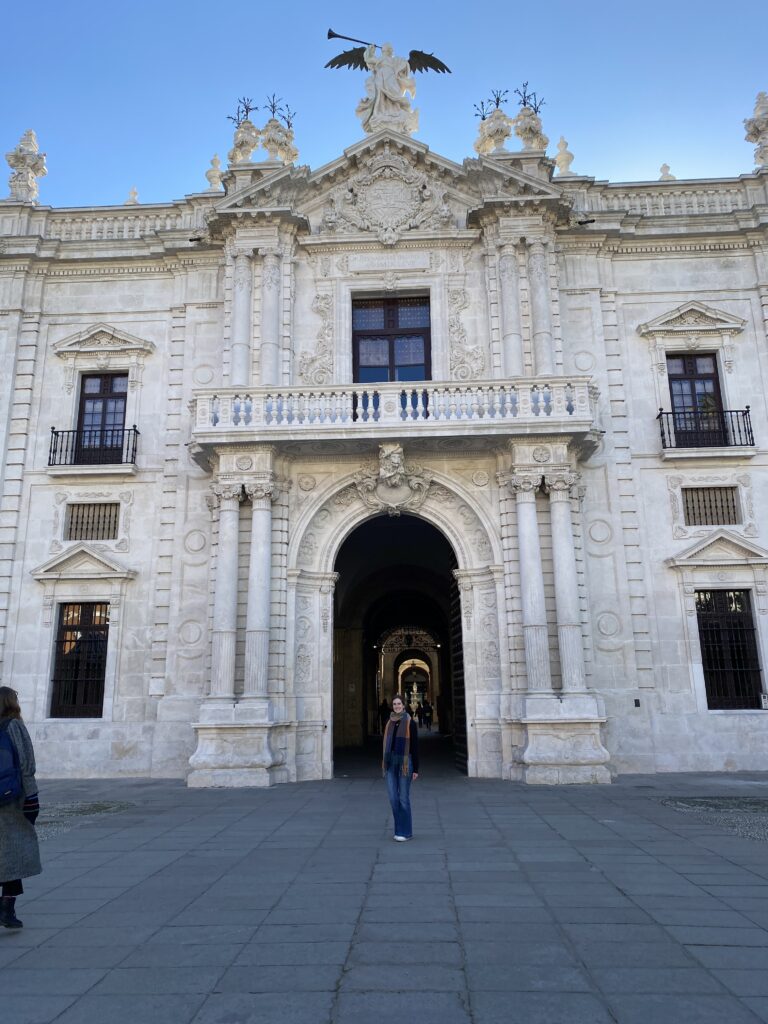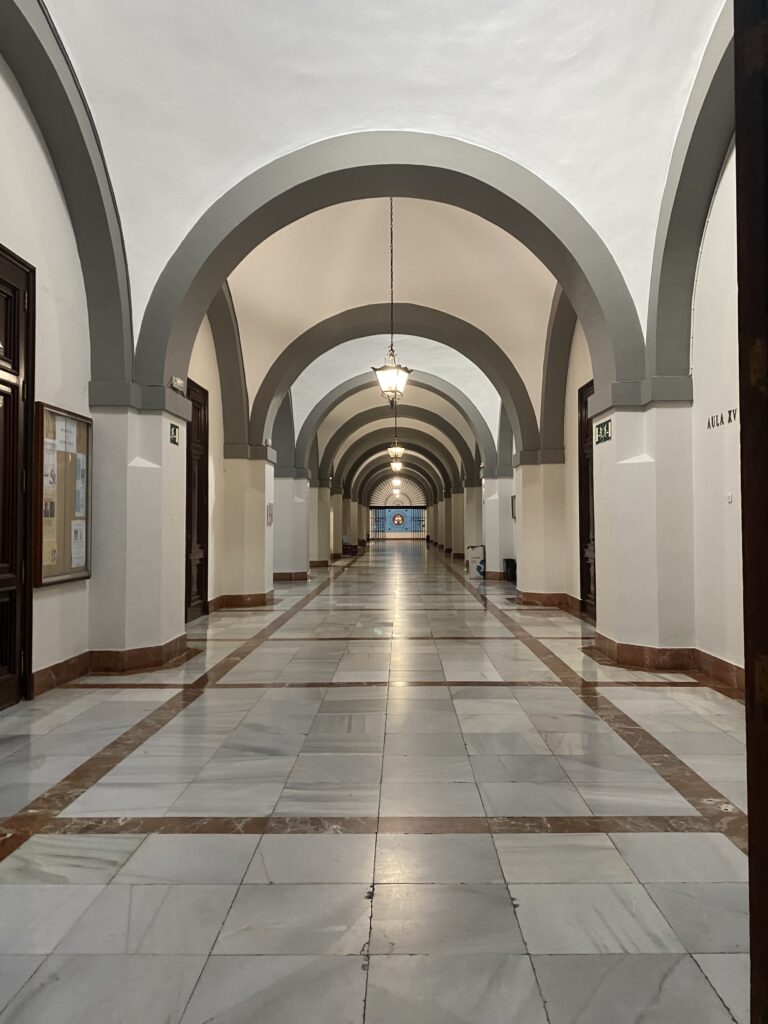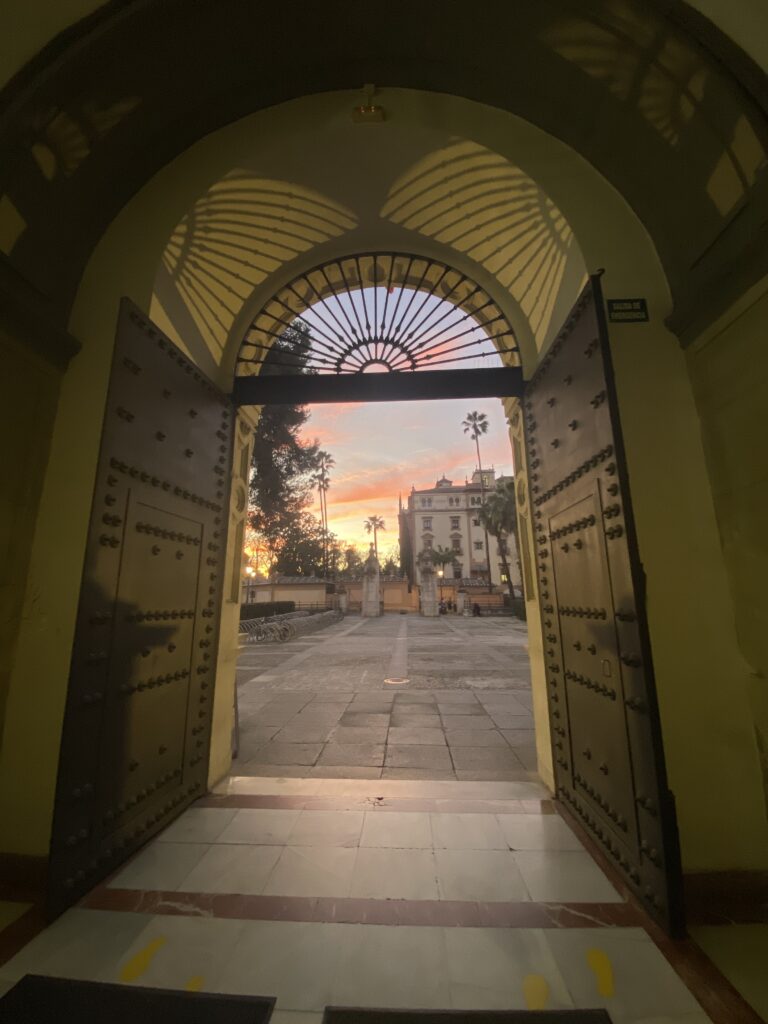Now, after only a few days less than a month in Sevilla, I sit outside of la Facultad de Filología at la Universidad de Sevilla, on a possibly centuries-old bench, under the already-potent, March sun of Andalucía, where the palm trees and other flora provide occasional shade to those who already seek it. A light breeze fills the three flags of Andalucía, Spain, and the European Union over la Facultad’s entryway. Public transit, horse-drawn carriages, and cars pass by at varying speeds on the other side of the long-dried-up-moat, from the centuries when la Facultad was the critical and well-guarded Real Fábrica de Tabacos, which helped control the world’s tobacco industry for several centuries. Lining the outside of la Facultad, other students sit on the benches or the lawn, where mill stones that once ground the tabaco from this factory are now an ideal spot to pass time with friends or study. Occasional passing conversations can be heard in tune with the chirping birds.
And yet, as I sit here, neither in silence nor in noise, I cannot think of a single topic to write about. I am a student of language and literature; and for this semester, “somos filólogos,” (we are philologists) as my professor reminds us — I want to make genuine meaning with these words.
A pack of about fifty tourists walk by, the crowd momentarily distracting from the normal rhythm of la Facultad. Led by a guide who shares the story of la Fábrica, which became la Facultad, the tourists mill about, aimlessly glancing at the massive edifice, casually snapping pictures on their phones. They haven’t heard a word of this history that the guide shares: they are engulfed in their search to capture the perfect photo, to document that they, for these fleeting moments, were here. And before a minute passes, they are gone — off to take the next photo for their camera roll, without being able to share the name of the site they are posing with.
Intrinsically, I smile a bit.
Travelling. It’s easy to do when studying abroad. Booking a flight, boarding a bus or train, visiting a new city — or even country — every weekend. The internet and student discounts make this all-too tempting of an opportunity. But why do this? Why take a plane (or train, or bus), to pass so few hours in a place, only to say that yes, you were there? Physically, yes; you were there. But, were you truly present in that place, in those ephemeral moments?
On an off-hand remark, mid-lecture here, a professor shared their desire to ask those same tourists if they’ve “ever thought of staying home and reading a book instead.” I would have to agree with the professor: to travel to set foot in a place misses the point of the journey.
This.
This is why I have been struggling to write.
I feel the need to share some extraordinary, life-changing trip I have embarked upon during my time abroad. Yes, while I certainly have had the opportunity to travel on incredible excursions to Madrid, Toledo, Lisbon, Granada, Ronda, Setenil de las Bodegas, and Extremadura, I haven’t truly gotten to know, conocer, these places. Sure, I know information, saber, about these locations, but I can relay this without a single sense of truly knowing the place.
Dicho esto, hay una ciudad que conozco muy bien. (That being said, there is a city that I know quite well.)
Sevilla.
The reason I am here. The city that I have stayed home and read books about for semesters. A language that I have studied and spoken for the vast majority of my life. I don’t need to write about some other, life-changing adventure I spent a weekend sleeping on a bus for, but instead, I have it right here, with me, every day.
During the week, my life-changing adventure starts every morning with the sound of my alarm at seven in the morning, giving me about an hour before I must leave to walk to my first class, at eight-thirty. I eat breakfast with my host mom, check over my bag for school, and leave just as the sounds of construction from across the street are beginning at eight. I walk alone, but with the many people who commute to work or school on-foot. I walk with the early morning, not yet burning, sun, watching it reflect on the Río Guadalquivir. Sometimes there are early-morning rowers, sometimes there are none. I walk onwards through a part of the city center, Puerta Jerez, until I reach la Facultad de Filología de la Universidad de Sevilla.
Other students file through the gates of la Universidad, passing through heavy doors fit for a fortress, under the angel who adorns the top of the building, and below the stone inscription that reads, Real Fábrica de Tabacos. We walk onwards, silently knowing our destinations, through marble hallways and with domed ceilings, walls plastered with posters for various university events, until we reach our respective aulas (classrooms).
Sitting down in my seat, I have a few moments before my first class of the day. Slowly, as it is early, between forty and sixty of my classmates file in and find their seats as well, chatting with friends or quietly preparing for the classes ahead.
At la Universidad de Sevilla, I’m incredibly lucky to have the opportunity to take integrated classes with the full-time Spanish students, where I am often one of the few international students in the classroom. I love this. I love that I am able to learn in an environment where the standards are set for native Spanish speakers, which only motivates me to improve my own Spanish, and where I have the opportunity to meet other full-time students from the University. It is truly the experience of a lifetime, that I am living every day.
During my first three classes, I spend my time furiously scribbling notes based on the professor’s lecture, learning new information and perspectives. Sometimes students ask questions, sometimes we stay silent and write. Between classes, there’s always a few moments to talk with friend before everyone is off to the next class.
After my first three classes, it’s time to leave la Univeridad de Sevilla. I walk home, now below the early afternoon sun, which the Río Guadalquivir reflects brilliantly. I eat lunch with my host mom, usually sharing our moments from the morning, in tune with the construction across the street.
Then, always sooner than I think, it’s time to go to class again. This time, however, as I begin walking, I’m not heading back to la Facultad, but instead to a local dance foundation, where I have the incredible opportunity to take a Flamenco dance course.
As I put on my tacones (flamenco dance shoes), I’m always a little bit offput. The English. This is one of my few cursos concentrados para extranjeros (classes with only American students), and it always catches me off-guard to hear them conversing in English about unfamiliar events and trips, as I am quite literally on a different schedule than them with my integrated classes.
Compás de tango, compás de alegría. Cierre. Tacón, golpe, punta. Floreo. Braceo. Marcaje. Tango de Granada. Alegría. I spend the next almost-two hours al baile (dancing flamenco).
Then, it is time to go to the library. Sometimes, in the afternoon, I meet up with friends para tomar un café, but today, it is to the library at la Facultad once again. Studying is a part of being a student, no matter where you are in the world.
Here, at la Universidad de Sevilla, the type of homework I receive is quite different from that of my university in the United States; there is a much greater emphasis on students’ intrinsic motivation to complete readings and long-term papers and projects instead of day-to-day readings and assignments to get through the next class. I don’t mind this. As long as I am able to manage my time and keep track of due dates (both those of the professor and those that I set for myself), the work is perfectly manageable, and albeit sometimes more enjoyable, as with long-term research assignments, I am able to take the time to explore in-depth a topic of interest that pertains to the class.
Usually, on these days, I am stepping out of the awe-inspiring marble halls of la Facultad just as the last moments of sunlight filter below the buildings and orange trees of Sevilla. Hues of pink, orange, and purple paint the sky.
Although this is an everyday, routine moment for me, I take a moment to pause in the doorway, appreciating it. While this might be my view each day, that does not mean it is not incredible. I am standing in the doorway of a 17th century building that I am lucky enough to be a student at this semester, watching the sun set over a city that carries centuries of history. A city that helped connect the New and Old Worlds.
I step out of la Facultad, pass under the gate of la Universidad de Sevilla, and onto the streets towards home. It is dark out and after eight p.m. And the streets are alive. After the recent conclusion of their workday, people sit outside in cafés, where almost every table is full. People of all ages — children, teenagers, adults young and old — walk with friends. Runners and cyclists whizz by, taking advantage of the recess from the beating sun to enjoy their daily workout. Groups of kayakers and rowers, their boats illuminated by navigation lights, paddle and row on the river. Other people walk, like me, heading home or running errands before dinnertime.
Once I arrive home, I say hello to my host mom, then I have a little bit of time to unpack from my day and finish any last-minute work. Then, I eat dinner with my host mom: conversing about our days, laughing, singing, rejoicing that the day’s construction outside has finished so that we can finally talk, killing the occasional fly ¡un amigo! (a friend!) that has invited itself to dinner through the open windows — the table is where together, you unpack both the joys and the challenges of your day.
Afterwards, the day concludes. I prepare myself for the next day, but more importantly, I relax. Even in the midst of a once-in-a-lifetime opportunity, every moment of the day cannot be occupied. I take time to write, converse with friends from home, let my mind wander in whatever language it chooses, but always reminding myself to stay present and enjoy these incredible, everyday moments, gracias a la vida (thanks to life).



Comments are closed.